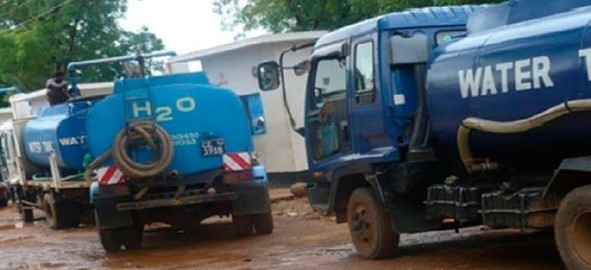Juba City has been hit by a water crisis after the owners of supply tankers protested over the City Council’s decision to reduce prices from SSP6,000 to SSP2,500.
Juba residents were bearing the brunt of the shortage, as alternative supplies were more expensive.
Some of the water tanker owners indicated on Wednesday morning the City Council’s decision was good, but there was a big problem with fuel prices. They called for the reduction of the fuel prices to cushion them and their customers.
An Ethiopian national who owns a tanker, but preferred not to be named, told Radio Tamazuj that the prices imposed by Juba authorities harmed the suppliers who had to contend with the exorbitant fuel costs.
“The barrel filling fees at the water point has risen to SSP18,000 from SSP3,000,” he said,
Another supplier from Eritrea said that he was losing SSP75,000 daily from taxes imposed by the Juba authorities and the traffic police.
“We are working today, but tomorrow we will strike,” he said.
A South Sudanese national Farouk Yousif, who owns a water tanker, said the Juba pricing did not serve the owners’ interests due to the spread of tax collection points by the authorities in the city.
He explained that according to the new prices, a 24-barrel tanker, costs SSP60,000, 18,000 of which went into the filling, SSP2,000 to traffic fees, and the rest, SSP40,000 to the driver, the assistant takes SSP5,000 to SSP10, meaning that the owner of the vehicle gets nothing.
He said more foreigners worked in the water supply sector and when they go on strike, the supply suffers.
Mariam Morris, who lives in Hai Kuwait of Munuki neighborhood, said that water tanker owners could reduce prices, but the problem was in fuel prices. Morris called on the government to reduce fuel prices, and thus reduce the cost of water.
The Executive Director of the Empowerment Organization, Edmund Yakani, called on the Juba authorities to hold a dialogue with water tanker owners before making the decisions, noting that water prices were linked to fuel costs.
“The markets in South Sudan are controlled by foreigners and the foreigners do not care much about the citizens. They only care about collecting money in South Sudan.”
Yakani revealed that the City Council did not study the conditions of the market before making the decision.
Radio Tamazuj tried to contact the Juba Municipal Council for a comment without success.




